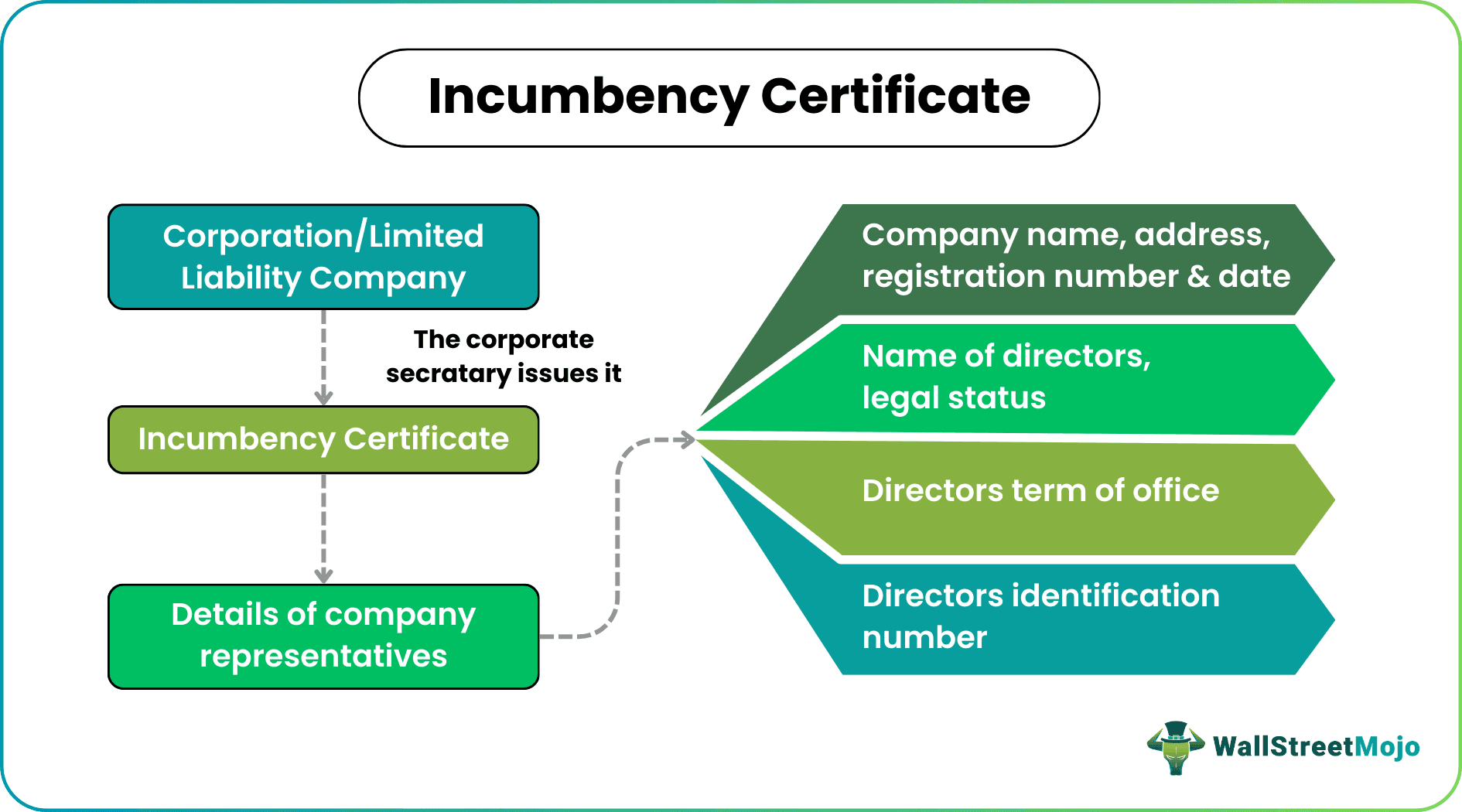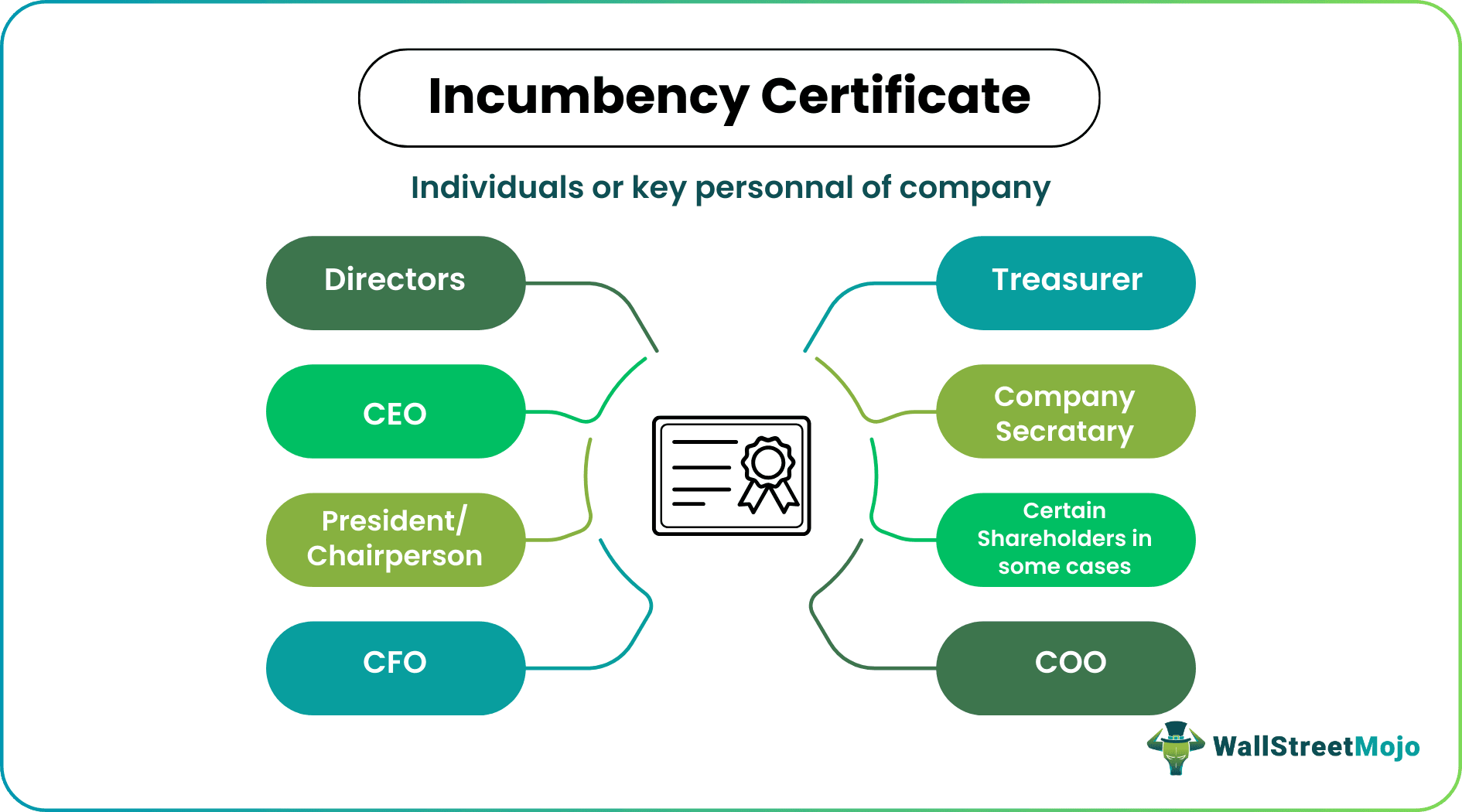Table Of Contents
Incumbency Certificate Meaning
An incumbency certificate is an official document containing the names of a firm’s directors, board members, and other key management members. Companies or limited liability entities are required to keep an incumbency certificate, which lists all the main individuals who are part of the organization.

The certificate assists in situations that demand a legally accepted document to prove the identity of an office-bearer. For instance, if a company is embroiled in a legal battle, the officer's identity in question will be officially validated through the company's incumbency certificate. The document provides details like the individual’s name, designation, and other important information.
Key Takeaways
- An incumbency certificate is an official document drafted by a corporation or limited liability company. It lists the individuals and key personnel who are legal representatives of the company.
- It lists out the names, designation, and other related details.
- The company secretary drafts the document as per the local laws.
- It is legally accepted and is significant in case of any legal problems.
Incumbency Certificate Explained
Incumbency Certificate is a legal document containing all details of representatives who are a part of the corporation or limited liability company.

Often, we have to produce our identity cards like a driver's license before entering an examination center or at the airport security check to prove our identity to the authorities. Similarly, an incumbency certificate template is a document that officially recognizes the existing key management officers within a company. So, for example, it will mention how George is the CEO in the current financial year. It will also note other board members and corporate officers.
Aside from the officers' names, the incumbency certificate format will contain additional details on their roles and positions in the firm. It can help one understand a couple of details, such as who holds the CEO position, was the member appointed or elected, when were they appointed, etc.
The officers mentioned in the incumbency certificate form can be understood as those legally representing the firm. It puts more responsibility and accountability on their shoulders, requiring them to always act in the firm's best interest and its stakeholders. At the same time, they will be required to ensure legal compliance. If there is an incidence of malpractice or scam in the firm, these office-bearers mentioned in the certificate will be the first ones to be questioned.
The individuals who may be mentioned in the incumbency certificate format are as follows:
- Directors
- President/Chairperson
- CEO
- COO
- CFO
- Treasurer
- Company Secretary
- Certain shareholders, in some cases
Example
Let us assume a company Star Industries, which has five individuals as directors. When the company issues an incumbency Certificate, it will contain the names of all five directors, who are the company’s legal representatives.
The document will also contain the legal status, identification number, term of office, etc., of all the directors of Star Industries.
Sample
Usually, the incumbency certificate template is drafted by the company secretary. For more credibility, the certificate is required to bear the company seal. Some local laws also mandate that the document gets notarized. Many local laws hold different rules for drafting such a certificate; as such a lawyer's expertise is required to ensure legal compliance. There is no fixed time regarding the certificate of the incumbency validity period.
The content is written in simple words without much use of legal jargon.
- In most cases, the incumbency certificate form starts with an introduction of the company and its registration status. It also lists the region, issue date, and the relevant company act when drafting the documents.
- This is followed by a brief introduction of those legally representing the company, their positions within the firm, and their signatures.
- It may also describe if they were elected or appointed.
- The final part of the document will include details of the firm/ individuals who drafted the document, their relevant qualifications, and their signature.
A sample incumbency certificate is shown below,

Source: https://templatelab.com/
Uses
There are many occasions in which an incumbency certificate can come in handy. For example, a bank may demand the certificate during a business account opening for a corporation. The certificate will validate the legally qualified key officers to represent the corporation. The certificate is also required during a merger or acquisition when the restructuring of the executive board is in order.
It may also be demanded during any company's financial and legal transactions. In such cases, the individuals specified in the certificate are held responsible for any risk associated with the company. The individuals listed in the certificate usually sign key company documents necessary for public disclosure, regulatory filings, partnerships, financial records, bank checks, etc.
Since there is no particular time for a certificate of the incumbency validity period, it can be used throughout the company's lifetime.
Incumbency Certificate Vs Certificate Of Good Standing
An incumbency certificate is a document providing the details of an entity’s key personnel whereas a certificate of good standing contains information about the entity. The differences between them are as follows:
| Incumbency Certificate | Certificate Of Good Standing |
|---|---|
| It gives details of company representatives. | It gives details about the company. |
| A limited liability company can issue it. | It is issued by the Companies Registration Office. |
| It is proof that the names of the people mentioned in it are authorized to act on the company’s behalf. | It is proof that the company is legal, and filings are updated. |
| It contains details of company directors, officers, and shareholders, their position, status, term of office, etc. | It contains details like company name, registration date, number, type of business, etc. |
